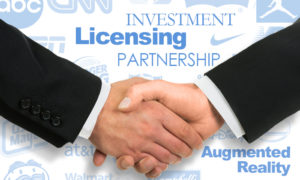
Thanks to my friend and colleague, Bill Newell, CEO of NorthSouth Studios for this guest blog.
After Apple’s keynote just last week, which was preceded by the launch of Apple’s ARKit, and Google’s ARcore, you can safely assume that the avalanche of AR products and services is on!
So, as we march into our first generation AR enterprise and consumer products, we find ourselves in a new frontier. Figuring out how to secure or assign rights, how to ask for or request royalties, and thinking how to protect your likeness, brand, and IP will be more important than ever. And of course, protecting new IP will be of equal importance.
I wanted to put my arms around these issues, since I create content and also enable others to create content or services. So I reached out to my friend Michael Leventhal. Michael works at Holmes Weinberg P.C. He has worked with media, and digital properties for a long time. He was also Magic Leap’s legal counsel. I think his combined experience puts him in a unique position to advise companies engaged in content creation and software development.
Michael started by reminding me that you need to begin by asking yourself why you want to use AR as a starting point. How you negotiate for rights, how you handle a potential revenue share, or an advance on royalties starts there. You have to know why you are doing something to be able to determine who your audience is, the potential size of your market, and the business opportunity. Once you have determined these factors, you are ready to approach the question of rights and brand protection with enough information to enable a qualified legal advisor to give you good input. For many of us, knowing how to identify the right legal advisor is tricky. I asked Michael for his thoughts on this matter and he suggested that in choosing legal help you should:
- Look for someone who is knowledgeable about the kind of project you are making; you probably don’t want someone learning on your dime.
- Broad knowledge of intellectual property. It’s important for your attorney to understand what is protectable in what you are creating, to be able to negotiate and document both your assignment of IP rights to third parties, and bring necessary IP to your project from outside owners.
- Business/corporate knowledge. Your attorney should be able to understand your corporate structure (or help you create it, if that hasn’t happened yet), and assist you in documenting financing, whether that is from project based or equity investment. You’ll be bringing on employees and consultants, so, an understanding of the legal issues related to these categories, and the ability to draft and negotiate these agreements is crucial.
- Connections in the AR/MR/VR world. Attorneys don’t traditionally play the role of matchmaker, but, if you have an attorney who knows the experts in the fields you’re working in, and can connect you with thought leaders, all the better.
- Partnerships, licenses, collaborations, etc. Often, financing, distribution, and marketing, among other areas, can be critical to the growth and success of your project. Having an attorney who understands how to structure these kinds of deals can be a powerful asset to your company.
If you want to learn more about this topic, how to create an AR experience, and meet Michael in person, you can join us at my panel at Digital Hollywood this coming October 10, at 12 Noon http://www.dhsessions4.com/Tuesday17Fl6.html . We’ll also be joined by Leon Laroue (Epson Moverio), Eric Trabold (Avegant), Soulaiman Itani (Atheer), Tom Wesselman (Plantronics), and Mike Hildebrandt (DAQRI). Come and learn about how your company can be part of this technological revolution and tremendous business opportunity.
